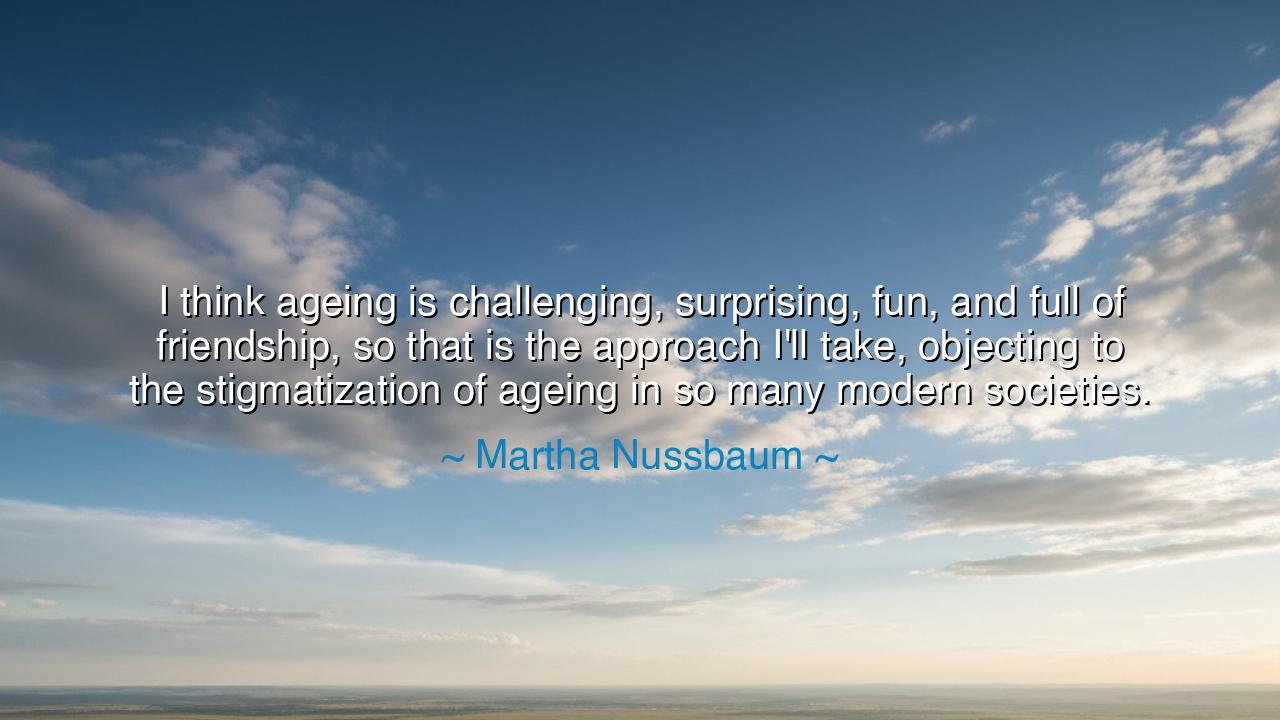
I think ageing is challenging, surprising, fun, and full of
I think ageing is challenging, surprising, fun, and full of friendship, so that is the approach I'll take, objecting to the stigmatization of ageing in so many modern societies.






In the wise and luminous words of Martha Nussbaum, we are given a radiant reflection upon the human journey: “I think ageing is challenging, surprising, fun, and full of friendship, so that is the approach I’ll take, objecting to the stigmatization of ageing in so many modern societies.” Here, the philosopher speaks not merely of growing older, but of living fully, of embracing the passage of time as both teacher and companion. Her statement is an act of rebellion against despair, a declaration that ageing need not be a decline, but a deepening — not a dimming of the flame, but a transformation of its color and warmth.
The ancients knew this truth well. In their wisdom, old age was not feared but revered — the twilight of life seen as a time when knowledge ripened into understanding, and understanding into peace. In Homer’s verse, the elders sat among the warriors not as relics but as oracles. In the East, the silver-haired were keepers of memory, voices through which the past spoke to the living. Yet in our modern age, where youth is idolized and novelty mistaken for worth, the face lined with years has been cast aside. Against this tide, Nussbaum stands like a philosopher of old — calm, defiant, radiant — calling us to remember that to age is not to decay, but to ascend into another form of wisdom.
She reminds us that the path of ageing is not without its challenges, for the body grows frail, and the mirror begins to whisper truths we once ignored. But alongside these trials come the surprises — new freedoms, new gentleness, new forms of laughter. The passions of youth give way to the serenity of reflection, and the hunger for conquest becomes the joy of companionship. The friendships of later years, no longer bound by ambition or pretense, are purer — born not of gain, but of shared endurance. Thus, as Nussbaum teaches, even in the creases of the hand and the silver of the hair, there dwell beauty and meaning.
Consider the example of Michelangelo, who, well into his eighties, still carved and painted, his spirit untouched by the passing of time. When asked why he continued to labor, he replied simply, “Ancora imparo” — I am still learning. This is the same spirit that breathes through Nussbaum’s words. For she too calls us to resist the stigmatization of ageing, to see the later chapters of life not as epilogues, but as new beginnings. The body may tire, but the mind and heart, if nurtured, grow vast and luminous. Those who live with curiosity and courage find that ageing, far from stealing life’s fire, fans it into a gentler, steadier flame.
Yet her message is not merely philosophical; it is moral. To scorn ageing is to scorn humanity itself. A society that shuns its elders forgets its roots; it becomes like a tree that denies the strength of its own trunk. In rejecting age, modern culture rejects continuity, humility, and wisdom — the very pillars of civilization. Nussbaum’s protest, therefore, is not just personal but universal: she calls upon us to restore reverence where vanity has planted shame. To see an elder’s face not as a mark of loss, but as a map of life lived with courage — that is the vision of a just and humane world.
And yet, within her words lies not solemnity, but joy. She calls ageing fun, not as jest, but as truth. For there is humor in perspective, lightness in acceptance, and delight in the company of those who have walked the same long road. When we laugh with friends in our later years, when we tell old stories with warmth instead of regret, we reclaim our power. The friendship that Nussbaum speaks of is not merely social; it is spiritual — a companionship of souls who, having faced the storms of life, now rest together under the same sun, wiser for the wounds.
Thus, dear listener, let her wisdom be a torch in your own journey: when time lays its gentle hand upon your shoulder, do not shrink from it. See in each passing year not loss, but transformation. Cultivate curiosity, nurture friendship, and face each sunrise with gratitude rather than fear. Speak proudly of your years, for they are the proof of your endurance. And when the world whispers that youth alone is beauty, answer, as the ancients would, that true beauty is the harmony of character and time — the glow of a spirit that has lived, loved, and learned.
So may we live as Martha Nussbaum teaches — embracing ageing not as an ending, but as a new adventure, challenging, surprising, and full of friendship. Let us walk forward, unashamed of the years that crown us, and show the world that to grow older is not to fade, but to flourish.






AAdministratorAdministrator
Welcome, honored guests. Please leave a comment, we will respond soon